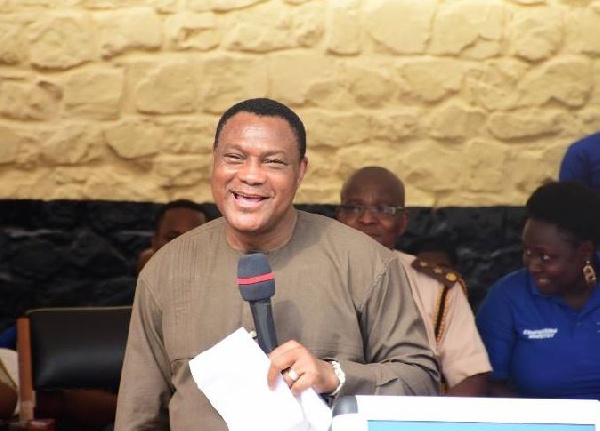Founder of Royalhouse Chapel International, Most Reverend Sam Korankye Ankrah has launched a passionate call for religious unity to tackle the Ghana’s mounting economic and political challenges.
The influential pentecostal leader is urging faith groups across the deeply religious West African nation to transcend their differences and work together for national renewal, arguing that proponents of the different positions have shared goals.
“There are more things that unite us than divide us. We all want to eliminate poverty. We all want to fight corruption. We all want strong moral values in society. We all want national development,” he said in an exclusive interview with the B&FT.
Religious organisations have historically contributed to Ghana’s progress, particularly in education, healthcare, and social welfare. However, with the global economic situation remaining uncertain, questions have emerged over whether these institutions can sustain their role in national development.
Church as an engine for social change
The scale of the church’s influence, Rev. Korankye Ankrah argued, requires it to go beyond spiritual guidance and actively support national development efforts.
“The church is one of the most powerful tools for national transformation. If the church cannot invest in raising future leaders, then how can we expect to see a lasting positive change in our nation?” He quizzed.
One such investment is the Royalhouse Chapel Scholarship Foundation, which has provided financial support to over 3,000 students since its launch in 1998. Initially limited to a handful of students, the programme now supports 150 per year.
“The foundation is open to non-members as well. There are cases where headmasters and school authorities have approached us on behalf of students in desperate need. We have helped students from across the country, including those from rural areas who had no prior connection to the church,” he explained.
Among its beneficiaries are medical doctors now serving across several towns and rural locations. “One notable case is a beneficiary who is currently the only doctor in his entire district in the Upper East Region. When we began sponsoring him, he was not a church member; his school simply applied on his behalf. Today, he is a practicing doctor, serving his community and saving lives.”
Free SHS
The education sector remains under pressure despite the introduction of Free Senior High School (SHS). Persistent challenges around funding and quality threaten the programme’s sustainability. While advocating for accessible education, Rev. Korankye Ankrah called for a revised model.
“Education should be accessible, but sustainability is crucial. The current Free SHS policy has challenges—delayed government funds, struggling schools, and resource constraints,” he remarked.
His proposed solution includes a hybrid system, where parents who can afford to contribute do so, freeing government resources for those in need. “We need a structured quota system, perhaps 60 percent fee-paying and 40 percent scholarship, to ensure long-term viability,” he suggested.
Healthcare, too, is an area where the church is increasing its footprints. Royalhouse Chapel currently operates a free Sunday medical clinic, offering medical screening and treatment for conditions such as malaria, hypertension, and typhoid. “Our long-term vision is to expand this into a full-fledged hospital operating 24/7 and serving the underprivileged,” he revealed.
The case for political unity
While religious institutions can provide essential social services, national development among other things, Rev. Korankye Ankrah contended that these can only be achieved in an atmosphere of political stability and unity.
Despite modest recovery, the economic outlook remains fragile, with inflation reaching 23.5 percent in January 2025, and the cedi continuing to depreciate, according to the Bank of Ghana. These difficulties, he argues, are exacerbated by entrenched partisanship limiting broader consultation and national dialogue for pragmatic solutions.
“Once elections are over, we must come together as Ghanaians to focus on national progress. We should convene at ‘Ghana’s Table’, not the NPP or NDC table, but a national platform where we discuss strengthening the cedi, creating jobs for young people, ensuring food security, and improving education and infrastructure,” he stressed, adding that “criticism is important, but it must be constructive.
Sitting on the radio and television just to attack the government achieves nothing. If you disagree with policies, propose alternatives. We need a spirit of nation-building, not perpetual opposition for opposition’s sake.”
Strengthening private sector to drive economic growth
Private sector engagement and an enabling environment for businesses to thrive, he argued, are key to Ghana’s economic recovery. To achieve these, he identified two priorities: “First, strengthening the private sector—entrepreneurs must be given the resources and support they need. Second, attracting investors—foreign and local investors should see Ghana as an attractive destination for business.”
He warned, however, that corruption remains a major deterrent. “If every business transaction requires a bribe for approval, investors will look elsewhere. In the digital age, word spreads fast. When a foreign investor is asked for a bribe, they go back and post about it on social media. Soon, Ghana earns a reputation as a corrupt country, and we drop further on global corruption indexes.”
Service leadership
For the Apostle General, governance and leadership must be redefined through a lens of service and accountability. “Leadership is about service, accountability, and vision. If we want Ghana to move forward, we must abandon the cycle of political division and work together as one people,” he noted.
He called for a renewed commitment to integrity across sectors. “Above all, we must embrace integrity, whether in politics, business, or ministry; we should act with honesty and responsibility. When we do this, Ghana and its citizens will surely prosper.”
Watch the latest edition of BizTech below:
Click here to follow the GhanaWeb Business WhatsApp channel
